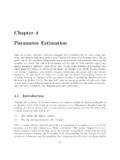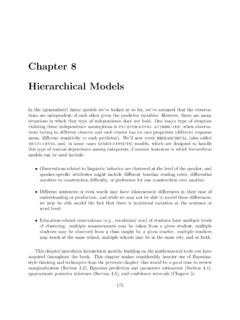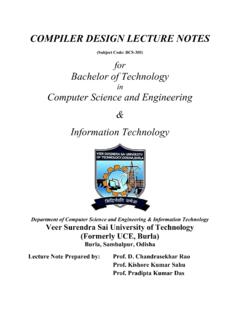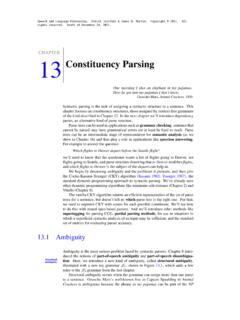Transcription of Ambiguity and Misunderstanding in the Law
1 Ambiguity and Misunderstanding in the Law Sanford Schane * "The law is a profession of words." 1 By means of words contracts are created, statutes are enacted, and constitutions come into existence. Yet, in spite of all good intentions, the meanings of the words found in documents are not always clear and unequivocal. They may be capable of being understood in more ways than one, they may be doubtful or uncertain, and they may lend themselves to various interpretations by different individuals. When differences in understanding are irresolvable, the parties having an interest in what is meant may end up in litigation and ask the court to come up with its interpretation.
2 In the eyes of the law, when this kind of situation arises, the contract or the legislative act contains " Ambiguity ". Paradoxically enough, the word Ambiguity itself has more than one interpretation. One of the senses, what I call the general meaning, has to do with how language is used by speakers or writers and understood by listeners or readers. Ambiguity occurs where there is lack of clarity or when there is uncertainty about the application of a term. It is this sense of Ambiguity that generally is meant within the law. The other sense, the restricted meaning, is concerned with certain lexical and grammatical properties that are part of the very fabric of language, irrespective of anyone's usage or understanding.
3 A word may have multiple definitions or a group of words may partake of more than one grammatical parsing. Linguists and grammarians have extensively investigated these features of language. I shall analyze three court cases claimed to contain " Ambiguity " or "ambiguous words".2 The claims are appropriate for the general meaning of these terms. Otherwise, the three cases of so-called " Ambiguity " turn out to be quite different. One of them exemplifies the restricted meaning of Ambiguity , whereas the other two present problems of reference and of vagueness. I shall discuss these differences of Misunderstanding and show that they played a role in how the cases were decided.
4 I. Three cases with so-called " Ambiguity " The first case, Frigaliment Importing Co. v. International Sales Corp.,3 gets embroiled in the definition of a chicken. Buyer, a Swiss company, has ordered * Research Professor of Linguistics, University of California, San Diego. Wayne State University; University of Michigan; Massachusetts Institute of Technology. Liberal Arts Fellow, Harvard Law School. 1 This is the opening sentence in David Mellinkoff's monumental work, The Language of the Law, Little, Brown & Co., Boston: 1963.
5 2 Frigaliment Importing Co. v. International Sales Corp.; Raffles v. Wichelhaus; Interstate Commerce Commission v. Kroblin. 3 190 ( (1960). Schane Ambiguity and Misunderstanding in the Law 2 frozen eviscerated chickens from a New York wholesaler of poultry. The order called for chickens of two sizes: 1 - 2 pounds, and 2 - 3 pounds. When the shipment arrives in Europe, Buyer discovers that the larger birds are all stewing chickens. Expecting broilers and fryers, Buyer cries "foul" and brings suit against Seller for breach of contract. The issue before the court becomes: "what is chicken?)
6 " 4 The plaintiff buyer contends that "'chicken' means a young chicken, suitable for broiling and frying."5 The defendant insists that a chicken is "any bird of the genus that meets contract specifications on weight and quality, including what it calls 'stewing chicken'."6 Judge Friendly, who heard the case, concedes that both meanings are possible. Consequently, he declares that "the word 'chicken' standing alone is ambiguous" (emphasis added),7 and he decides to look to the contract to see whether it offers any aid for the interpretation of this word. The second case, Raffles v. Wichelhaus,8 is notoriously known to law students.
7 The bizarre events of this English case took place in 1864, before there were telegraphs, telephones, or e-mail. The buyer purchased bales of cotton that were to be sent from Bombay, India to Liverpool, England on a ship called the "Peerless". At the time of the making of the contract it was unbeknown to the parties that there were two different ships by the name of "Peerless". One of them was to leave Bombay in October, the other in December. The buyer expected the goods to be on the October ship, whereas the seller planned to place them on the December vessel; neither of them was aware of the other's intent.
8 When the October Peerless arrived in England, naturally there were no bales of cotton on it for the buyer. When the December Peerless sailed in to port with the shipment, the buyer refused acceptance. Seller then brought suit against Buyer. Counsel in support of the defendant buyer's plea noted that "there is nothing on the face of the contract to shew [sic] that any particular ship called the 'Peerless' was meant; but the moment it appears that two ships called the 'Peerless' were about to sail from Bombay there is a latent Ambiguity (emphasis added).." 9 4 Frigaliment.
9 The legal issue, of course, is whether the seller supplied the buyer with the goods that the buyer had ordered. 5 Frigaliment. 6 Frigaliment 7 Frigaliment 8 2 Hurl. & C. 906, 159 Eng. rep. 375 ( ). 9 Raffles Schane Ambiguity and Misunderstanding in the Law 3 The third case, Interstate Commerce Commission v. Allen E. Kroblin, Inc.,10 once again deals with eviscerated chickens. This time we find the ICC against farmers in a heated dispute over whether dressed and eviscerated chickens are manufactured products. One of the roles of the ICC is to certify trucking companies engaged in interstate commerce, and most goods that are transported between states must be carried by these certificated or regulated carriers.
10 However, there is an exemption for certain agricultural commodities, such as fruits and vegetables, fish, ordinary livestock, and agricultural commodities that are not manufactured products. 11 Thanks to this exemption, farmers are able to use less costly uncertificated conveyances for moving agricultural goods from state to state. The ICC claims that dressed and eviscerated poultry is a manufactured product, whereas the Department of Agriculture maintains that it is an agricultural commodity. The Court notes that "all parties are agreed that the words 'agricultural commodities' and 'manufactured products thereof' used in the agricultural exemption are ambiguous words" [emphasis added].


















